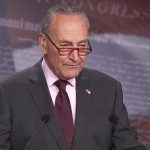AP Photo/Brynn Anderson, File
- Stacey Abrams’ Fair Fight PAC has spent “extraordinary” sums on security, experts said.
- The spending comes as lawmakers and candidates increasingly turn to campaign funds for protection.
- Experts say rising partisan violence has made security a new cost of political activity.
A political action committee tied to Democrat Stacey Abrams spent nearly $1.4 million for private security last year, according to federal disclosures — an extraordinary sum that watchdogs say reflects the rising threat of partisan violence in the United States.
Abrams, a prominent liberal now running for Georgia governor, launched the advocacy group Fair Fight to address voter suppression following her narrow loss in 2018 to Gov. Brian Kemp. After initially focusing on Georgia, the group has expanded in recent years to work with Democrats in multiple swing states to prevent voter suppression.
In 2021, the group directed most of its security spending to a single firm: Atlanta-based Executive Protection Agencies.
The security firm’s CEO, Tim Howard, has promoted his work with Abrams and Sen. Raphael Warnock of Georgia on social media, posting photographs of himself with the two Democrats and other prominent figures, including the tennis star Serena Williams, actress Halle Berry, and President Joe Biden.
On its website, Executive Protection Agencies advertises its bodyguards as “current or former elite law enforcement officers.” The firm says that celebrities, models, and other high-profile individuals are “at risk” and need security expertise.
“These are the facts of life, but you don’t have to let them determine your life. There is a light at the end of the tunnel, and it comes in the form of professional bodyguards for hire,” the firm states. “You don’t want overpriced bouncers with an attitude; you want experts whose skills and training are focused like a laser beam on one purpose: your total well-being.”
—Tim Howard (@EPASecurity) October 13, 2020
Fair Fight, which ended 2021 with nearly $19.3 million cash on hand, paid Howard’s firm alone more than $1.2 million in 2021, according to a review of disclosures filed with the Federal Election Commission. Several other private contractors received the remainder of Fair Fight’s security service payments.
It’s unclear from federal records what kinds of security services Fair Fight procured.
“That is a huge amount of money being spent for security purposes,” said Craig Holman, a government affairs lobbyist for nonprofit watchdog group Public Citizen. “It’s unfortunate. I never thought I’d see the day when candidates for public office had to routinely fear for their lives and safety, but here we are. It’s the whole new American political landscape.”
Fair Fight and Executive Protection Agencies did not respond to Insider’s requests for comment.
Executive Protection Agencies’ other clients include Rep. Nikema Williams of Georgia and Warnock, a Democrat who defeated former Sen. Kelly Loeffler in a special election held between 2020 and early 2021, according to disclosures.
Fair Fight’s security payments stand out because only a handful of federal political committees or candidates, or high-profile state candidates, spend more than four-figures annually on private security payments, an Insider analysis of federal campaign finance records indicates. Most don’t hire private security at all.
Nevertheless, Fair Fight’s spending coincided with members of Congress and political candidates increasingly turning to campaign funds to pay for bodyguards and other security measures.
Such security spending became easier in March 2021, when the FEC ruled that members of Congress could spend campaign funds on “bona fide, legitimate, professional personal security personnel.”
But some lawmakers had charged protection-related expenditures to their campaigns even before the agency’s ruling, particularly in the weeks after supporters of then-President Donald Trump attacked the US Capitol on January 6, 2021.
“This is not an uptick, this is a huge avalanche of new spending on security. And it all began with the Trump,” Holman said. “Trump supporters and Trump himself have encouraged violence against those who disagree with Trump.”
Photo By Tom Williams/CQ-Roll Call, Inc via Getty Images
For many lawmakers, the January 6 attack served as a wake-up call to the threat of violence in American politics. As the pro-Trump mob ransacked the Capitol, then-Vice President Mike Pence and House Speaker Nancy Pelosi were whisked away to safety while other elected officials huddled behind police-guarded doors.
Following the Capitol siege, Mother Jones reported that Republicans who criticized Trump were among the biggest spenders on security. Rep. Liz Cheney, a Republican from Wyoming who voted in favor of Trump’s second impeachment, hired a security consulting firm and retained three Secret Service agents who’d previously protected her father, former Vice President Dick Cheney.
Cheney had not previously used campaign funds on security. Sen. Mitt Romney, a Utah Republican who voted to convict Trump in his second impeachment, also hired a security firm.
During the first nine months of 2021, Rep. Ilhan Omar, a Minnesota Democrat, spent nearly $30,000 on security, federal records show. One of the firms she retained, Aegis Logistics LLC, specializes in “executive protection” and consulting, according to its website.
Rep. Alexandria Ocasio-Cortez spent $73,000 through the first 9 months of 2021 on security services, according to the New York Democrat’s disclosures with the FEC. Among her selected firms was Three Bridges NY, which offers “executive protection,” and the Texas-based 24/7 Security & Investigation, which provided a security detail in Houston, the disclosures show.
Republican Sen. Ted Cruz of Texas spent nearly $250,000 on the services of Atlas Glinn, a security firm that advertises itself as skilled in “dignitary protection, training, consulting, and investigations.” The homepage of Atlas Glinn’s website features a smiling Cruz with his arm around the firm’s founder and CEO, Matthew Brockmann.
Warnock spent nearly $500,000 in 2021 on Executive Protection Agencies.
Alan Chin for Insider
Beyond the January 6 attacks, prominent politicians have been targeted in plots or seriously wounded in attacks.
A gunman shot Rep. Gabrielle Giffords, a Democrat from Arizona, in the head during a 2011 constituent event, nearly killing her. In 2017, a gunman shot Republican House Whip Steve Scalise of Louisiana while he was practicing for the annual Congressional Baseball Game in Alexandria, Virginia. A neighbor attacked Republican Sen. Rand Paul of Kentucky, breaking several of his ribs and cutting his face.
In 2020, 14 men were arrested and charged in connection with an alleged plot to kidnap Michigan Gov. Gretchen Whitmer. Of the six arrested on a federal kidnapping conspiracy charge, one has pleaded guilty and is expected to testify against the rest at a trial later this year.
Death threats, meanwhile, have become commonplace in politics. Then-Acting Capitol Police Chief Yogananda Pittman testified in March that threats to federal lawmakers had increased nearly two-fold during the first two months of 2021 compared to the first two months of 2020.
And the threats don’t just target elected officials, but unelected public servants, as well.
Unlike a US president, members of Congress do not receive Secret Service projection. US Capitol Police, meanwhile, don’t generally travel with lawmakers or directly protect them when they’re away from the Capitol complex, save for high-profile events such as presidential nominating conventions.
“There is a reasonable fear that I think any campaign might have of being targeted. We’ve not only seen the January 6 attacks but a growing number of election officials being threatened,” said Lee Drutman, a senior fellow at New America who has studied political violence. “There’s a growing movement of far-right activists who are basically spoiling for civil war.”
Powered by WPeMatico






